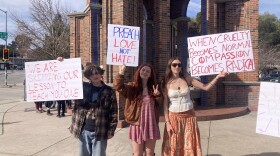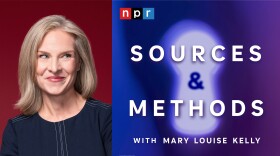
Amy Mayer
News DirectorAmy Mayer is an award-winning journalist with more than 25 years of experience in public radio. Before KAZU, she worked as an editor for the California Newsroom and at St. Louis Public Radio. For eight years, she covered agriculture as the Harvest Public Media reporter based at Iowa Public Radio. She's also worked at stations in Massachusetts and Alaska and has written for many newspapers, magazines and online news outlets.
contact: amy@kazu.org
-
A state regulator rejects Vistra's plans for assessing the impact on surface water and groundwater from its 2025 Moss Landing battery fire, local residents and elected officials denounce ICE operations, a local writer shares her perspective on the violent crackdowns in Iran, and more in this week's local news roundup.
-
A weeks-long, violent crackdown on protesters in Iran has eased. Though dissent no doubt remains, an Internet blackout has made it hard to know exactly what’s happening. Still, the recent clashes drew international attention, again, to the harsh realities for Iranians.
-
Santa Cruz County activists protest Immigration and Customs Enforcement activity in Minneapolis. And, a conference about ecological farming returns to Monterey County.
-
A San Mateo-based tech company has permission to test its flying cars at the Hollister airport. BenitoLink reporter Noe Magaña shares his reporting about the company and the region’s growing rapport with electric aircraft businesses.
-
Monterey County is expanding its hiring policy for veterans. And, the Hollister airport signs a lease with a flying-car company.
-
Santa Cruz voters approve Measure C and Monterey Bay counties overwhelming vote for temporary redistricting. And, a violence prevention organization co-hosts a film screening about society’s narrow expectations of masculinity.
-
UC Berkeley journalism instructor and historian Adam Hochschild says he wrote American Midnight: The Great War, a Violent Peace and Democracy's Forgotten Crisis during the first Trump administration because he was struck by similarities between President Woodrow Wilson’s agenda and some of President Donald Trump’s aspirations.
-
Local veterans protest for peace at the Naval Postgraduate School in Monterey. And, Santa Cruz and Monterey will join communities around the world in celebrating Sun Day to support solar energy efforts.
-
NPR's Mary Louise Kelly is hosting a new national security podcast, Sources and Methods. She talked about it with KAZU.
-
Local officials and residents are celebrating the opening of a 72-unit affordable housing project in Watsonville. And, California Democrats have less than two weeks to get a redistricting measure on the November ballot.











